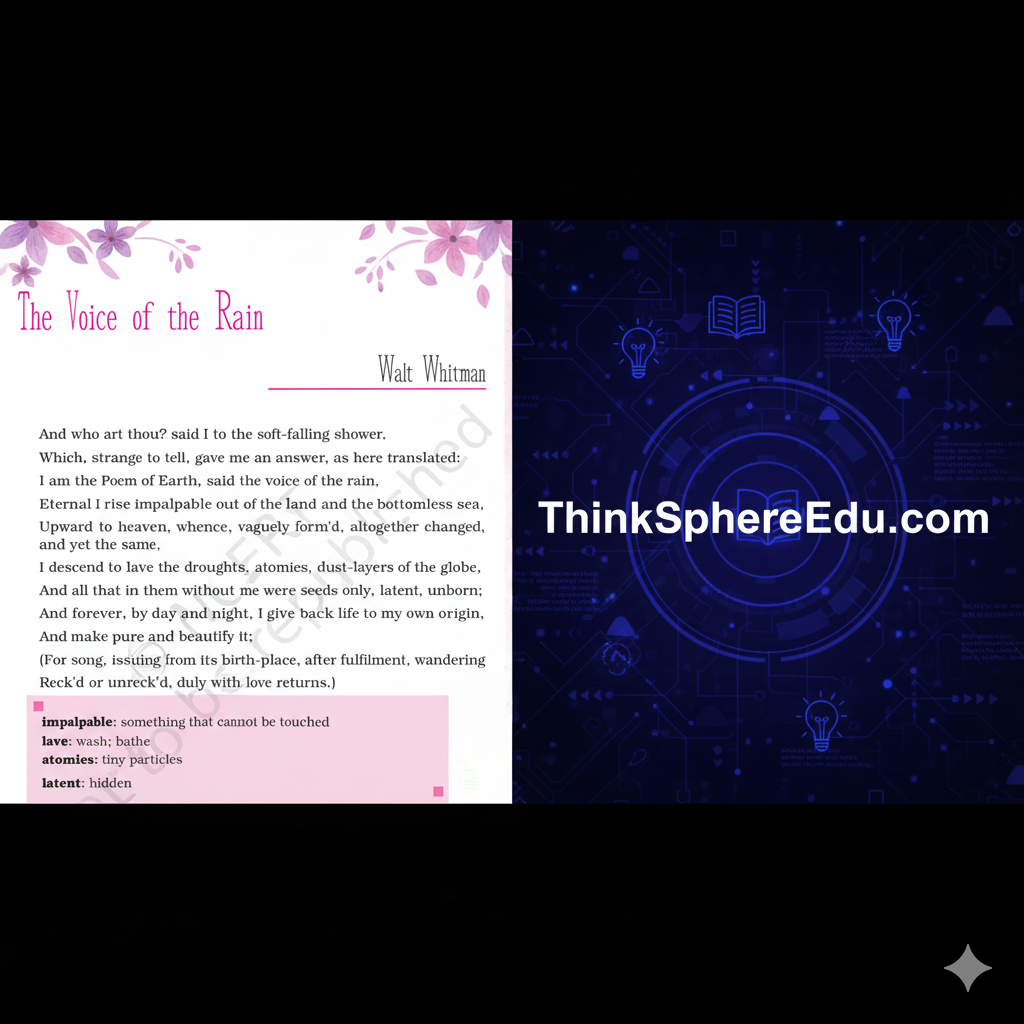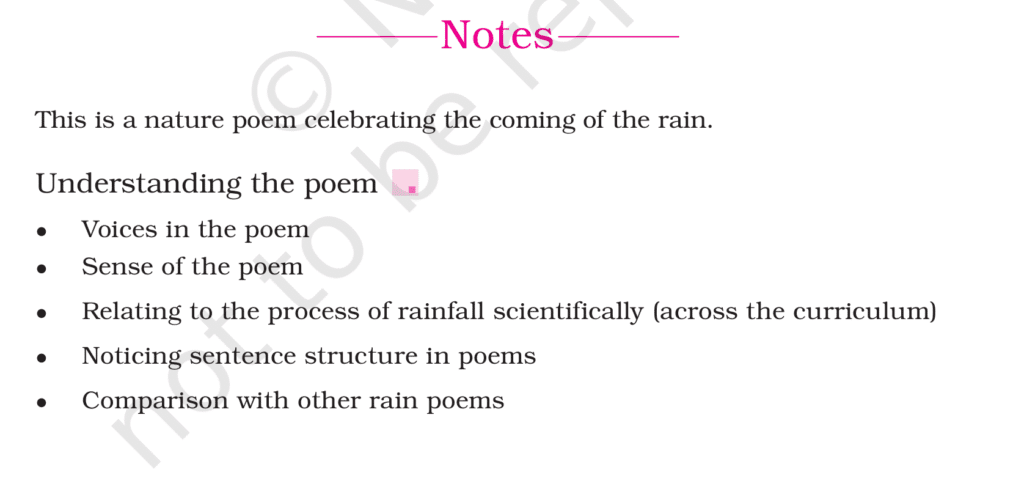
Hornbill | Class 11 The Voice of the Rain Question Answer Solved | NCERT Solutions & Summary, it is essential for young learners to build a strong foundation in the subject, and CBSE Class 11 English Solutions, Understanding the chapter thoroughly helps students grasp key concepts, improve comprehension, and perform well in exams. Also, we provide The Voice of the Rain Question Answers | and NCERT Class 11 English Sample Papers.
In this article we will provide you The Voice of the Rain summary in English, Hindi and Bengali.
Table of Contents
The Voice of the Rain Question Answer Solved | NCERT Solutions & Easy Explanation
The Voice of the Rain summary in English: (The Voice of the Rain Question Answer)
In this poem, Walt Whitman depicts a conversation between himself and a shower. When he asks the soft-falling shower aforesaid, “Who are you?” The answer came promptly from the rain, “I am the earth’s poem.” Then it explained: The everlasting cycle – from the land and boundless sea, the vapor rises up, climbs the skies, assumes the form of clouds, and thereafter falls as rain.
While descending, it cleans his coveted dust, watering the seeds that are lying inside the earth waiting to become full-grown with a little help. It keeps on such work with life-giving spirit day and night wherever it may be called back. The poet likens rain to a song that, returning back to its origin with love and beauty, completes its journey.
The Voice of the Rain summary in Hindi: (The Voice of the Rain Question Answer)
इस कविता में, वॉल्ट व्हिटमैन ने अपने और एक वर्षा के बीच एक संवाद का चित्रण किया है। जब वह पूर्वोक्त कोमल वर्षा से पूछते हैं, “तुम कौन हो?” तो वर्षा की ओर से तुरंत उत्तर आया, “मैं पृथ्वी की कविता हूँ।” फिर वर्षा ने समझाया: यह शाश्वत चक्र – भूमि और असीम सागर से, भाप ऊपर उठती है, आकाश में चढ़ती है, बादलों का रूप धारण करती है, और उसके बाद वर्षा के रूप में बरसती है।
उतरते हुए, यह अपनी अभिलाषित धूल को साफ करती है, उन बीजों को सींचती है जो धरती के अंदर पड़े हैं और थोड़ी सी मदद से पूर्ण विकसित होने की प्रतीक्षा कर रहे हैं। यह जीवनदायी भावना के साथ दिन-रात ऐसा ही कार्य करती रहती है, जहाँ भी इसे वापस बुलाया जाता है। कवि वर्षा की तुलना एक गीत से करते हैं जो प्रेम और सौंदर्य के साथ अपने उद्गम की ओर लौटकर अपनी यात्रा पूरी करता है।
The Voice of the Rain summary in Bengali: (The Voice of the Rain Question Answer)
এই কবিতায় ওয়াল্ট হুইটম্যান নিজের এবং ঝরনার মধ্যে কথোপকথন চিত্রিত করেছেন। যখন তিনি উপরের নরম ঝরনাটিকে জিজ্ঞাসা করেন, “তুমি কে?” তখন বৃষ্টি থেকে উত্তর আসে, “আমি পৃথিবীর কবিতা।” তারপর এটি ব্যাখ্যা করে: চিরন্তন চক্র – স্থল এবং সীমাহীন সমুদ্র থেকে, বাষ্প উপরে উঠে, আকাশে উঠে, মেঘের রূপ ধারণ করে এবং তারপরে বৃষ্টি হিসাবে পড়ে।
নামার সময়, এটি তার কাঙ্ক্ষিত ধুলো পরিষ্কার করে, সামান্য সাহায্যে পূর্ণ বয়স্ক হওয়ার অপেক্ষায় পৃথিবীর ভিতরে পড়ে থাকা বীজগুলিকে জল দেয়। এটি দিনরাত জীবনদায়ী আত্মার সাথে এই কাজ চালিয়ে যায় যেখানেই তাকে ডাকা হোক না কেন। কবি বৃষ্টিকে এমন একটি গানের সাথে তুলনা করেছেন যা প্রেম এবং সৌন্দর্যের সাথে তার উৎপত্তিস্থলে ফিরে আসে এবং তার যাত্রা সম্পন্ন করে।
Also Read
- Class 11 English NCERT Solutions Hornbill 2025-26 | Chapter wise free pdf answers
- The Portrait of A Lady Class 11 Questions With Answers Solved
- The Laburnum Top Questions And Answers | Hornbill
Think it out (The Voice of the Rain Question Answer)
I.
1. There are two voices in the poem. Who do they belong to? Which lines indicate this?
Answer:
The two voices in the poem belong to the poet and the rain. At the beginning, the poet asks a question to the rain, “And who art thou? said I to the soft-falling shower.” The second voice is that of the rain itself, which replies, “I am the poem of Earth, said the voice of the rain.” These lines clearly show the conversation between the poet and the rain.
2. What does the phrase “strange to tell” mean?
Answer:
The phrase “strange to tell” means that it was unusual and surprising for the poet that the rain actually replied to his question. Normally, rain cannot speak, but here it is personified and given a voice. The poet finds it strange yet remarkable that the rain could answer him.
3. There is a parallel drawn between rain and music. Which words indicate this? Explain the similarity between the two.
Answer:
The words that indicate the parallel between rain and music are, “For song, issuing from its birthplace, after fulfillment, wandering recked or unrecked, duly with love returns.”
The similarity is that both rain and music follow a complete cycle. Rain rises from the earth as vapor, changes form in the sky, and returns to the earth to give life. In the same way, a song rises from the heart of the poet, travels through the world, gives joy to people, and eventually returns to its origin with love. Both rain and music are natural and eternal and bring beauty and life wherever they go.
4. How is the cyclic movement of rain brought out in the poem? Compare it with what you have learnt in science.
Answer:
The cyclic movement of rain is shown in the poem through the rain’s own explanation. It says that it rises “eternal… out of the land and the bottomless sea,” goes upward to the sky, changes its form, and then returns to the earth to wash away dust and give life to seeds. This shows the continuous water cycle – evaporation, condensation, and precipitation.
In science, we learn the same process, water evaporates from the land and oceans due to heat, forms clouds by condensation, and finally falls back as rain. Thus, the poem beautifully presents the scientific water cycle in a poetic and imaginative way.
5. Why are the last two lines put within brackets?
Answer:
The last two lines are put within brackets because they serve as a concluding thought or reflection separate from the main description of the rain’s cycle. They explain the idea poetically, comparing the rain to a song that, after completing its journey, returns to its origin with love.
6. List the pairs of opposites found in the poem.
Answer: Here are the pairs of opposites found inthe poem.
- Land and heaven
- Rising and descending
- Latent and born
- Formed and changed
- Drought and life
Also Read
- A Photograph Class 11 Questions And Answers
- We are not afraid to die Class 11 Questions and Answers Solved
II. Notice the following sentence patterns.
- And who art thou? said I to the soft-falling shower.
- I am the poem of Earth, said the voice of the rain.
- Eternal I rise
- For song…duly with love returns
Rewrite the above sentences in prose.
Answer:
- I asked the soft-falling shower, “Who are you?”
- The voice of the rain replied that it was the poem of the Earth.
- I rise from the land and the bottomless sea eternally.
- A song, after issuing from its birthplace and completing its journey, returns with love.
Also Read
- Discovering tut: The Saga Continues – Class 11 english chapter 3 question answer
- The Laburnum Top Questions And Answers | Hornbill
The Voice Of The Rain Class 11 Poem Extra Question and Answers
The Voice Of The Rain Short Answer Type Questions
1. Who are the two voices in the poem? Which lines indicate this?
Answer: The two voices are the poet and the rain. The poet’s voice is indicated by:
“And who art thou? said I to the soft-falling shower.”
The rain’s voice is indicated by:
“I am the Poem of Earth, said the voice of the rain.”
2. What does the phrase “strange to tell” mean?
Answer:
The phrase “strange to tell” means that it was unusual and surprising for the poet that the rain actually replied to his question. Normally, rain cannot speak, but here it is personified and given a voice.
3. How is the cyclic movement of rain brought out in the poem?
Answer:
The rain describes its eternal cycle: it rises from the land and the bottomless sea, forms clouds in the sky, and then descends to the earth to nourish it. This continuous process symbolizes the water cycle.
4. What does the rain do to the droughts, atomies, and dust-layers of the globe?
Answer:
The rain descends to wash away the droughts, dust, and impurities of the earth, purifying and beautifying it. It also nourishes seeds, helping them to grow.
5. Why are the last two lines put within brackets?
Answer:
The last two lines are the poet’s own reflection, comparing the rain to a song. They are placed within brackets to distinguish them from the rain’s voice, indicating that these are the poet’s personal thoughts.
The Voice of the Rain Question Answer
6. What is the significance of the word ‘song’ in the poem?
Answer:
The word ‘song’ symbolizes the rain’s journey from its origin, its fulfillment in nourishing the earth, and its return to its source. It highlights the cyclical nature of life and nature’s processes.
7. How does the rain benefit the earth?
Answer:
The rain nourishes the earth by washing away impurities, quenching the thirst of dry lands, and aiding in the growth of seeds, thereby sustaining life.
8. What does the rain mean by ‘I am the poem of Earth’?
Answer:
By saying “I am the poem of Earth,” the rain identifies itself as an expression of nature’s beauty and life, akin to a poem that conveys emotions and stories.
9. From where does the rain rise?
Answer:
The rain rises from the land and the bottomless sea, in the form of vapor, as part of the natural water cycle.
10. What does the phrase ‘reck’d or unreck’d’ mean?
Answer:
The phrase ‘reck’d or unreck’d’ means whether noticed or unnoticed. It suggests that the rain fulfills its purpose regardless of human acknowledgment.
The Voice Of The Rain Long Answer Type Questions (The Voice of the Rain Question Answer)
1. How is the cyclic movement of rain brought out in the poem “The Voice of the Rain”? What points of similarity do you notice between rain and music?
Answer:
The rain calls itself the poem of earth. It is everlasting and perpetual. It is something that cannot be touched. It originates from the land and the deep sea. Then it rises upward to heaven where it changes its form into a cloud, yet remains the same in quality. From the sky it pours down on earth to wash the dry tiny particles and dust layers of the earth. The rain helps the unborn seeds to sprout.
These seeds lay hidden and unborn under the layers of earth. Rain gives back life to its origin making it pure and beautiful. Rain and music are both beautiful and life-giving. They are eternal sources of joy and go on perpetually. They inspire even dormant objects and persons with life and activity.
You can refer this Notes section for further preparation


2 thoughts on “The Voice of the Rain Question Answer Solved | NCERT Solutions & Easy Explanation | Class 11”